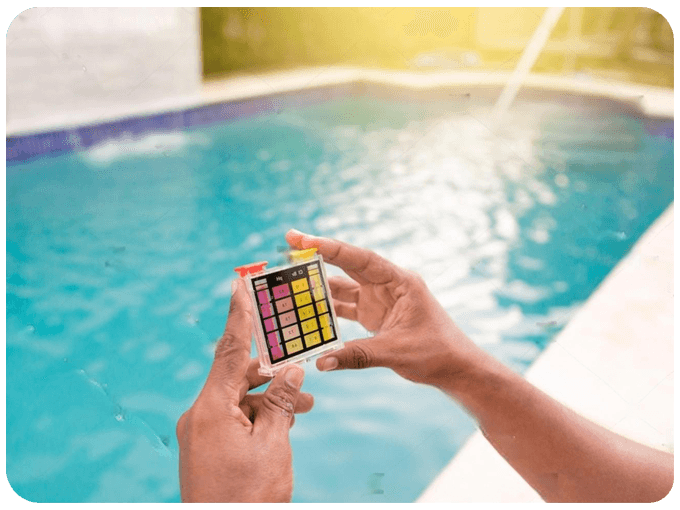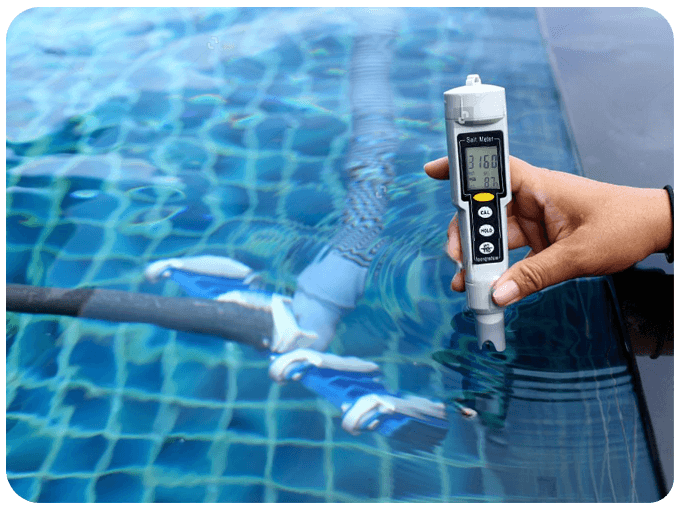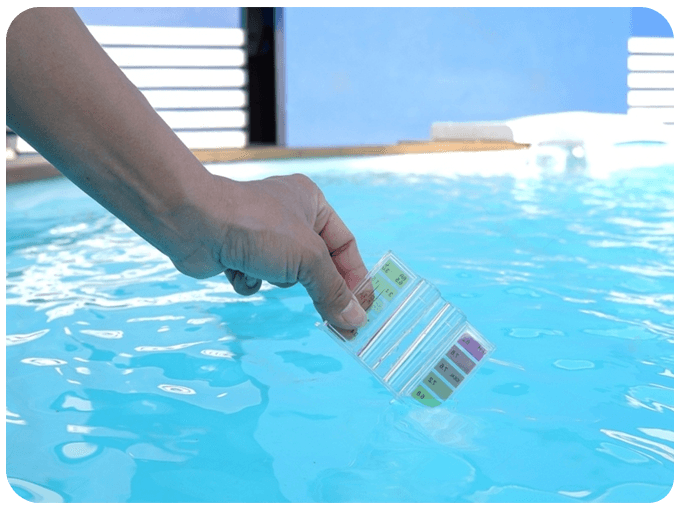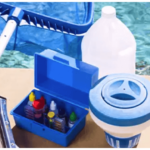The fiberglass pool in your home is more than just a place to cool off; it’s a personal oasis that deserves attention and care. In this article, we’ll explore the importance of water testing kits specifically for fiberglass pools, detailing key features and providing answers to frequently asked questions.
Table of Contents
Importance of Water Quality in Fiberglass Pools
The well-being of your fiberglass pool largely depends on water quality. Maintaining a proper balance ensures the pool’s durability and swimmers’ comfort.
Testing kits are essential tools for monitoring and adjusting chemical levels in the water. In the case of fiberglass pools, it’s crucial to choose a kit designed specifically for these structures.
Types of Water Testing Kits
- Basic Kits
Basic kits are ideal for owners who prefer a traditional approach. They include pH, chlorine, and alkalinity tests, providing essential information for basic maintenance.
- Advanced Kits with Electronic Sensors
For those seeking convenience and accuracy, electronic kits with sensors are the right choice. They offer quick and precise measurements, with the ability to store data for long-term tracking.
- Specialized Kits for Fiberglass Pools
Some manufacturers offer kits specifically designed to address the unique needs of fiberglass pools. These kits consider material compatibility with certain chemicals.

Benefits of Using Testing Kits
A. Preventive Maintenance
Regular use of testing kits allows early detection of chemical imbalances, avoiding costly long-term issues and prolonging the pool’s lifespan.
B. Long-term Cost Savings
By identifying problems before they worsen, owners can save money on repairs and replacements. Testing kits are a wise investment for pool durability.
C. Swimmer Health Protection
Maintaining adequate disinfectant levels and chemical balance not only preserves the pool but also protects the health of those who enjoy it.
How to Use a Water Testing Kit for Pools
- Kit Preparation: Open the testing kit and ensure all reagents are in good condition and within their expiration date. Review the included instructions to familiarize yourself with the testing process.
- Water Sample Collection: Fill a clean, transparent container with pool water taken about 30-45 cm (12-18 inches) below the surface. Avoid collecting water near return jets or the skimmer, as it may affect test results.
- pH Testing: Use the pH test from the kit following specific instructions. Typically, a specific number of drops of reagent will be added to the sample water and gently shaken. Then, compare the resulting color with a provided color scale in the kit to determine the water’s pH level.
- Chlorine Testing: For chlorine testing, add the required number of drops or tablets of reagent to the sample water and gently shake to mix. After a specified time, compare the resulting color with the color scale provided in the kit to determine the level of free available chlorine in the water.
- Alkalinity and Total Hardness Testing (Optional): Some testing kits also include tests to measure total alkalinity and total hardness of the water. Follow the kit’s instructions to perform these additional tests if necessary.
- Interpreting Results: Once all tests are completed, compare the resulting colors with the color scales provided in the kit to determine pH, chlorine, and other chemical levels in the pool water. Be sure to follow manufacturer recommendations to correct any chemical imbalances as needed.
- Recording Results: Record test results in a pool maintenance log to track chemical levels over time and make adjustments as necessary in pool maintenance.

Important Specifications
A. Measurement Ranges
Kits vary in the ranges they can detect. It’s crucial to choose a kit with the capability to measure specific levels necessary for fiberglass pools.
B. Technology Used in Kits
From traditional chemical tests to electronic sensors, understanding the technology used helps owners select the most suitable kit for their needs.
C. Compatibility with Fiberglass Pools
Not all kits are equally compatible with this type of pool. Researching and choosing a kit specifically designed for fiberglass ensures accurate results.
Tips for Choosing the Right Water Testing Kit for Pools
A. Evaluate Specific Pool Needs
Determining the pool’s size, usage, and environmental conditions helps select a kit that suits its unique needs.
B. Compare Features and Prices
Research is key when choosing a testing kit. Comparing features and prices ensures an informed and satisfactory purchase.
C. Consider Brand Reputation
Opting for reputable brands in the market ensures the quality and effectiveness of the testing kit.
Importance of Maintaining Water Balance
- Proper pH prevents issues like eye and skin irritation and prevents damage to the fiberglass structure.
Adequate Chlorine Levels
- Chlorine keeps the water clean and safe for swimming, preventing the growth of bacteria and algae.
Prevention of Common Fiberglass Pool Issues
- Proper water maintenance prevents stains, discoloration, and damage to the pool surface.

Frequently Asked Questions About Water Testing for Pools
How often should I test my pool water?
- Frequency depends on usage and weather conditions, but testing at least once a week is recommended.
How do I interpret test results?
- The kit instructions provide clear guidelines for interpreting results. In case of doubts, consult with a professional.
Are electronic kits more accurate than manual kits?
- Yes, they are generally more accurate, but manual kits are still effective for basic maintenance.
Are there differences in kits based on pool size?
- Some kits are designed for larger pools, while others are ideal for smaller pools. Choose according to your pool size.
Can I use a generic testing kit on a fiberglass pool?
- It’s not recommended. It’s preferable to use a kit specifically designed for fiberglass pools for accurate results.
Can I use a generic testing kit on any pool?
- Yes, but for more accurate results, it’s advisable to use a kit designed specifically for the pool type.
What happens if I don’t test the water regularly?
- Failure to test regularly can lead to issues like algae growth, eye irritation, and pool damage.
Are electronic kits difficult to use for beginners?
- No, most electronic kits come with clear instructions, making them accessible even for beginners.
Is it necessary to hire a professional for pool maintenance?
- While advisable, owners can perform basic maintenance with the help of testing kits and following manufacturer instructions.
When should I replace my testing kit?
- It’s recommended to replace the kit annually to ensure test accuracy.
Conclusions
Summary of the importance of water testing kits
In summary, water testing kits are indispensable allies for maintaining fiberglass pools in optimal condition.
Final Tips for Effective Maintenance
Keep regular testing records and follow manufacturer recommendations for effective and long-lasting maintenance.


